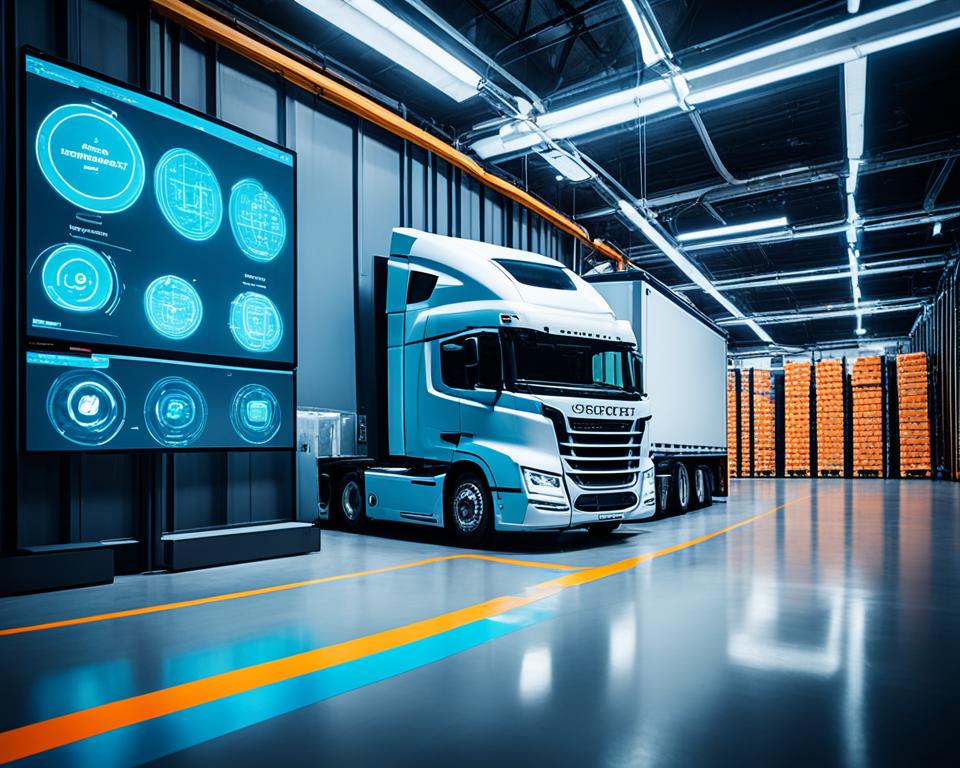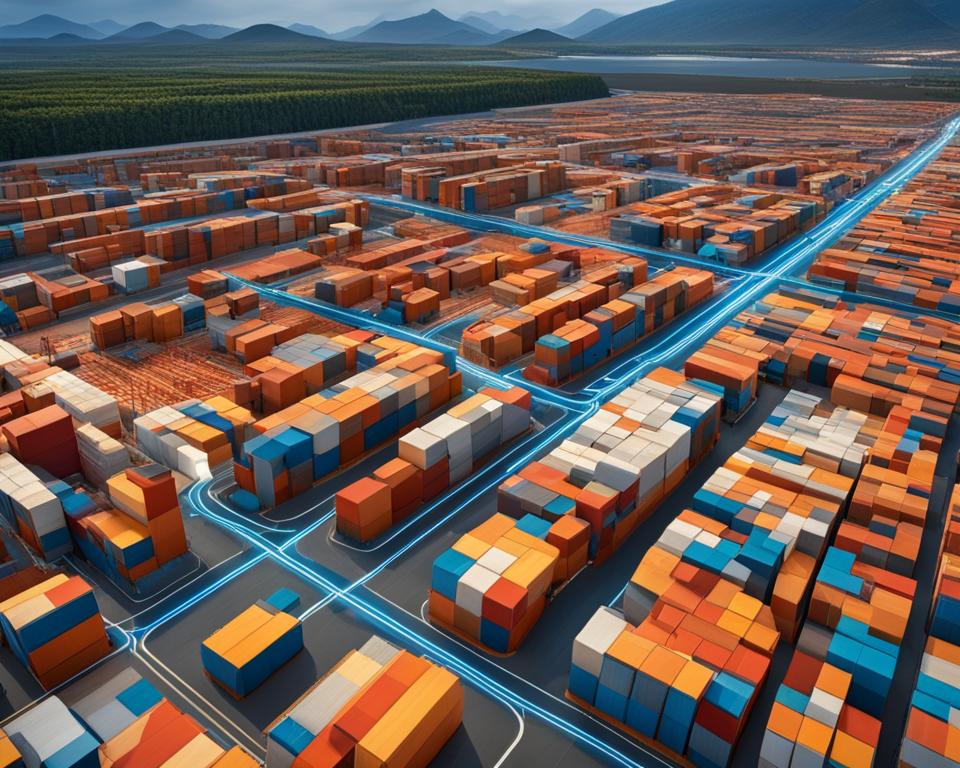Adverts
According to the “IoT Snapshot 2022” study, between 2018 and 2021, 57% of Brazilian companies are already implementing IoT solutions in their businesses. In the logistics sector, IoT technology is being widely adopted due to the high volume of information that needs to be collected, processed and analyzed on a daily basis. The most used solutions include asset monitoring and predictive maintenance, geolocation and tracking of deliveries and external logistics. A IoT in logistics increases efficiency, provides greater safety, reduces costs and promotes innovation in the sector.
Adverts
Main points covered in this article:
- What is IoT in Logistics
- Benefits of IoT in Logistics
- Challenges and IoT Trends in Logistics
- Conclusion
What is IoT in Logistics?
A IoT in Logistics, or Internet of Things in Logistics, is the application of technologies such as IoT, artificial intelligence and automation to optimize logistics processes. IoT allows devices to be connected via the internet, enabling real-time monitoring of assets, vehicles and goods.
This provides Greater visibility and control over logistics operations, improving efficiency, decision-making and service quality. A IoT in logistics also involves the real-time data collection, which enables accurate tracking of assets throughout the supply chain.
“IoT in Logistics allows the application of advanced technologies to optimize processes, provide real-time data and improve decision-making in the logistics sector.” – Logistics Specialist
Adverts
IoT functionalities in Logistics
| Benefits | Description |
|---|---|
| Bigger logistics efficiency | Process automation, real-time tracking and supply chain optimization. |
| Data-based decision making | Collection and analysis of information in real time for more assertive decisions. |
| Improvement in service quality | Precise traceability and control, ensuring delivery on time and in appropriate conditions. |
| Increase of logistics security | Asset monitoring and prevention of theft, loss and damage. |
Benefits of IoT in Logistics
The adoption of IoT in logistics brings several benefits to companies. Some of the key benefits include:
- Better traceability of cargo and assets throughout the supply chain.
- Real-time monitoring of transport conditions, such as temperature, humidity and other parameters.
- Early identification of problems and failures, allowing immediate corrective actions.
- Automation of logistics processes, such as inventory, fleet management and optimized routing.
- Increased security of logistics operations.
- Reduction of operational costs, such as fuel consumption and waste.
The use of IoT in logistics provides greater efficiency, traceability and security to logistics processes. Through real-time monitoring and task automation, companies can optimize their supply chain, reduce costs and offer a higher quality service to customers.

| Benefits of IoT in Logistics |
|---|
| Better traceability of cargo and assets throughout the supply chain |
| Real-time monitoring of transport conditions |
| Early identification of problems and failures |
| Logistics process automation |
| Increased security of logistics operations |
| Reduction of operational costs |
IoT Challenges and Trends in Logistics
The implementation of IoT in logistics presents challenges that need to be overcome to make the most of the benefits that this technology can bring. Among the main challenges is ensuring the security of connected devices and integrating systems from different suppliers, aiming for efficient interoperability.
Considering the IoT trends in logistics, it is possible to glimpse significant advances that are shaping the future of the sector. The expansion of 5G technology, for example, promises to improve the connectivity and speed of devices, allowing more efficient communication between them. This enables even more accurate and reliable real-time monitoring.
Furthermore, trends point to the increased use of autonomous vehicles in logistics, which could revolutionize the way deliveries and transportation of goods are carried out. This automation allows for greater operational efficiency, cost reduction and less dependence on human resources.
The development of smart warehouses is another important trend. Through the implementation of technologies such as sensors, drones and robots, it is possible to optimize inventory management, movement of goods and carrying out inventories, promoting greater agility and precision in logistics operations.
The quest for data security is also an emerging trend in IoT in logistics. With the use of blockchain technology, it is possible to guarantee the integrity and reliability of information, making processes safer and more transparent.
These trends are driving the concept of logistics 4.0, which aims to integrate advanced technologies to provide greater efficiency, sustainability and personalization of logistics operations. A logistics 4.0 seeks to create an intelligent, connected and adaptable supply chain to market demands.

IoT in logistics represents a horizon of possibilities and transformations for the sector. Overcoming challenges and being aligned with trends is essential to take advantage of all the advantages that this technology can offer. By facing these challenges and adopting the IoT trends in logistics, companies will be prepared to face the challenges of the future and build efficient, safe and innovative logistics.
Conclusion
IoT in logistics is revolutionizing the sector in a profound and irreversible way. It is exciting to be part of this advance towards more efficient and intelligent logistics. Companies that adopt innovations from logistics 4.0 are well positioned to thrive in an increasingly connected and data-driven world.
Investing in technology is essential to reap the benefits of this logistics revolution. IoT offers opportunities to improve operational efficiency, reduce costs and increase the security of logistics operations. Furthermore, it is important to train teams to deal with new technologies and constantly seek continuous improvement.
The future of logistics promises even more advances. Autonomous deliveries are expected to become increasingly common, ensuring greater agility and precision. Predictive logistics will allow you to anticipate problems and take preventative measures, ensuring a continuous flow of operations. Sustainability will also be a focus, with the use of renewable energy and reducing environmental impact. Additionally, personalization and multimodal delivery networks will be essential to meet the demands of a constantly evolving market.
In short, IoT in logistics offers a promising future, with smarter and more efficient logistics. Be prepared to surf this wave of innovation and stay ahead of the competition!

 Recover your Email Password Easily and Safely! Advertisements Losing your email password can be a
Recover your Email Password Easily and Safely! Advertisements Losing your email password can be a